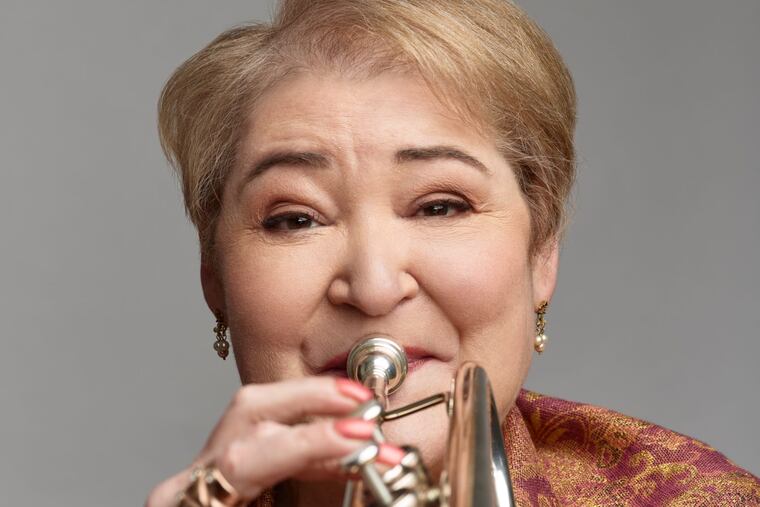Kicking tuchus and taking names: The Philly mom and daughter behind a new klezmer supergroup
Susan Watts and her late, great mother Elaine Hoffman Watts are the soul of "Soul Songs: Inspiring Women of Klezmer," in concert Oct. 28 at Annenberg.

In 2017, at 85, Philly klezmer musician Elaine Hoffman Watts was still kicking major tuchus behind the drum kit, often performing with her daughter, the klez trumpet dynamo Susan Watts.
The two were planning to co-anchor the ambitious Oct. 28 Annenberg concert "Soul Songs: Inspiring Women of Klezmer," spotlighting a dozen world-class female performers.
As third- and fourth-generation practitioners of klezmer — essentially, Jewish soul music — the mother-daughter team had already won major honors and media acclaim. A Philly music episode of public radio's American Routes included them alongside John Coltrane, Billie Holiday, Gamble and Huff, and the Roots. The Watts women also inspired the documentary film Eatala: A Life in Klezmer.
Sadly, Elaine Hoffman Watts succumbed to illness 13 months ago. The drummer's seat will be left vacant when an international contingent of 11 "Inspiring Women" gathers for the Philly show, sponsored by the Philadelphia Folklore Project and underwritten by $160,000 in grants from the Pew Center for Arts and Heritage.
"This is not another tribute concert, looking back," said Susan Watts. "It's a step into the future. It's just that honestly I haven't been able to find another female klezmer drummer good enough to take my mom's place."
>> WATCH: Elaine and Susan Watts perform together in 2010
That's a telling comment. Klezmer hasn't enjoyed much popular acclaim since the world music wave of the 1980s and '90s. The hope is that "Inspiring Women," designed with touring aspirations, might spur another revival.
Klezmer is ancient Hebrew for "musical instrument" and has melodic roots in the chanting of Jewish cantors, filtered through Romani (gypsy) jazz and folksy Slavic-Baltic styles. In Russia in the early 20th century, it became a Jewish boy's rite of passage. At age 5, he'd be handed a violin and urged to join an all-male pickup band.
Even in today's #MeToo environment, "it's still not so easy for women players/composers to earn a place on stage in most klezmer bands, except in the token female singer slot," says artist-activist Jenny Romaine, who is behind the inventive production design for Sunday's premiere. "And where women do squeeze in, they're less likely to get the soloing time needed to grow in confidence, professionalism, and recognition."
It's still forbidden for female klezmer musicians to mingle with male players on the bandstand at Orthodox Jewish celebrations, "although Orthodox women loved to have my mom and me play at their ladies-only events," said Susan Watts.
Women of the klez club
Susan's mother had been initiated into the klez club by her Ukrainian-born father, Jacob Hoffman, himself both a bearer of rootsy tradition and a serious composer and classical player — xylophonist for the Philadelphia Orchestra under the batons of Leopold Stokowski and Eugene Ormandy.
Elaine went on to become the first female percussionist admitted to (and graduating from) the Curtis Institute of Music. As a young professional in the 1950s, she worked in opera productions, symphony orchestras, ice shows, jazz, and music theater pit bands. "But she was only ever invited to play in klezmer groups fronted by her father," noted Susan.
Susan Watts sharpened her own musical chops at Temple University's Boyer College of Music and the St. Louis College of Music, studying with Philadelphia Orchestra trumpeter Seymour Rosenfeld and the St. Louis Symphony Orchestra's Susan Slaughter. She has long maintained her own, mostly female klezmer groups.
Meet the band
The ensemble performing as the Inspiring Women of Klezmer is the product of years spent scouting international klezmer music gatherings like KlezKanada. Its talented musicians mix spiritual and secular traditions. Most have conservatory training. All have a daring creative bent.
Listeners can expect out-there, 12-tone, and cool jazz reveries from keyboardist Marilyn Lerner, along with invigorating romps by violinist Cookie Segelstein that are inspired by klez music from the Carpathian Mountains.
Also on board are the acclaimed violinist Alicia Svigals, a co-founder of the revival group the Klezmatics; and trombonist Rachel Lemisch, who works in the high-energy Gypsy Balkan and Klezmer/Turkish traditions.
Violinist Deborah Strauss, clarinetists Zoe Christiansen and Ilene Sthal, accordionist Lauren Brody, flute player Adrianne Greenbaum, and bassist Joanna Sternberg complete the ensemble.
What to expect when you’re klezmering
Anyone who's danced to "Hava Nagila" at a Jewish wedding or bar/bat mitzvah already has a smidgeon of klezmer in the soul. The score to the Broadway musical Fiddler on the Roof (coincidentally back in town this week at the Academy of Music) also lifts liberally from klezmer modalities, hiccupy rhythms, and those aching/laughing bends of clarinet and violin notes.
But why stop there? "The Israeli hora style that people dance to at parties is just one of many variations on klezmer," says Watts.
Similarly, "as a gateway drug, Fiddler is not bad," Romaine adds. "If that music and the Sholem Aleicheim story line stirs your longings for roots and cultural connection, come see us."